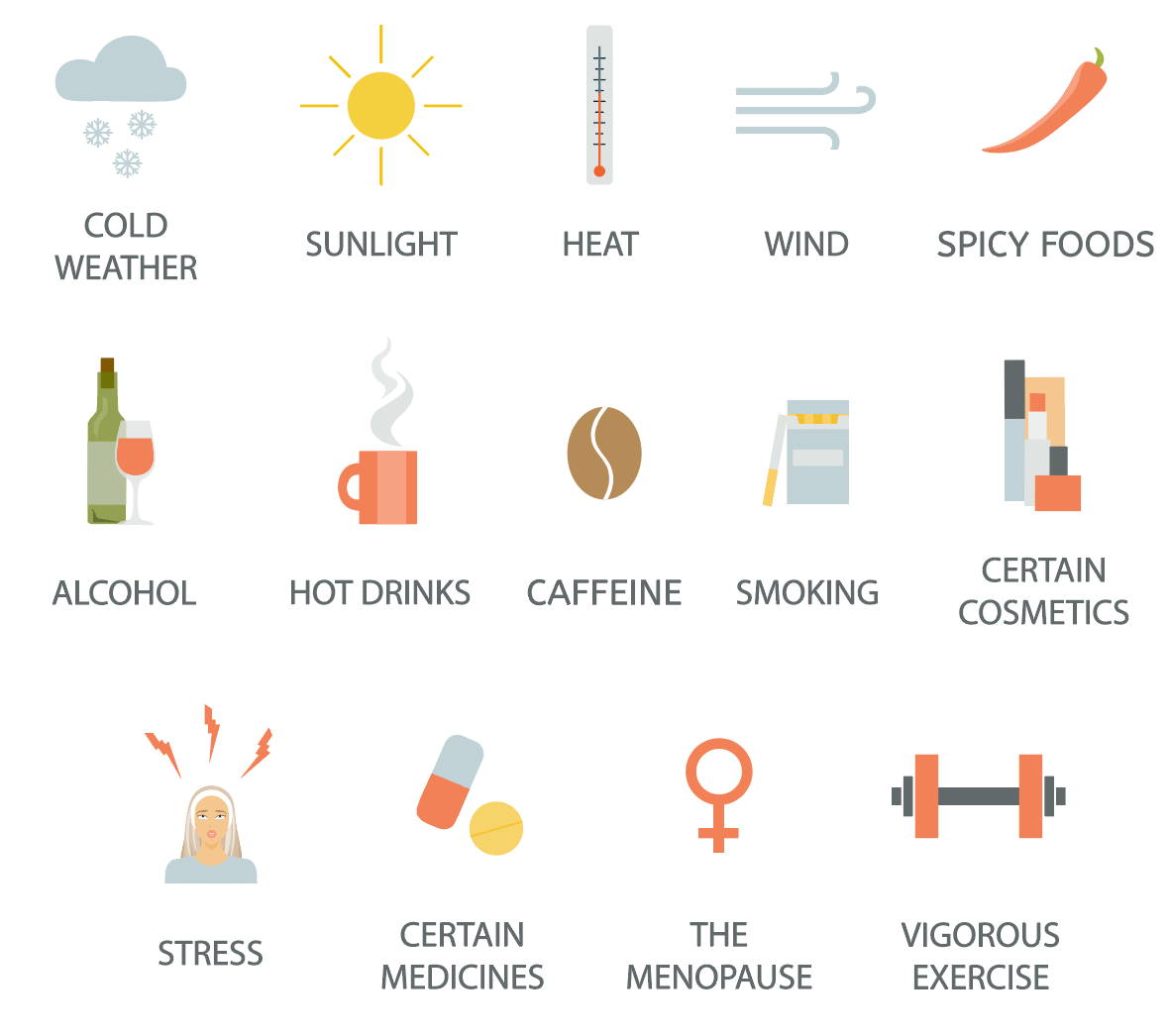What is Rosacea?
- Category: Health & Wellness, Skin Health
- Posted On:
- Written By: LVMC

Rosacea is a common skin condition that can be effectively managed with medications and healthy skincare routines.
Rosacea is a common skin condition that affects more than 16 million Americans. This facial condition is characterized by redness, visible blood vessels, and small, red bumps that are often mistaken for acne. Rosacea cannot be cured, though it can often be effectively managed and controlled to reduce flare-ups.
April is Rosacea Awareness Month. Knowing more about rosacea can help you determine whether you have this skin condition and benefit from treatment.
Read on to learn more about rosacea and how Lompoc Valley Medical Center can treat you for this condition.
What Are Symptoms Of Rosacea?
Signs and symptoms of rosacea may vary slightly from one person to the next. This skin condition tends to impact people with fair skin and affects women more often than men.
Symptoms of rosacea include:
- Facial flushing and redness, usually in the central part of the face, including the nose and cheeks
- An enlarged swollen nose that appears bulbous, usually in men more often than in women
- Swollen, red, pus-filled bumps that resemble acne
- Small, red lines/blood vessels under the skin
- Thickened skin, usually on the cheeks, forehead, and chin
- Eye and vision problems, including redness, dryness, itching, and swelling of the eyes and eyelids
What Causes Rosacea?
Rosacea may be caused by any one of several factors. However, scientists remain unsure about what can cause rosacea in any one person.
Potential causes of rosacea include:
- Genetics and/or a family history of rosacea
- Immune system reaction to the Bacillus oleronius bacteria
- Helicobacter pylori (H. pylori) infection in the intestines
- Presence of a mite called Demodex folliculorum on the skin, which primarily lives on the nose and cheeks
- Abnormal processing of a protein called cathelicidin that protects the skin
Several triggers can cause rosacea flare-ups. Common triggers of flare-ups include:

What Are Risk Factors Of Rosacea?
Meeting certain risk factors can make you more likely to develop rosacea. Common risk factors for rosacea include:
- Being female
- Being aged 30 years or older
- Having skin that is sensitive to the sun
- Having light or fair skin
- Having blond hair and blue eyes
- Being of Celtic or Scandinavian ancestry
- Smoking
- Having relatives with rosacea or severe acne
- Having a history of acne
Though some people may be more likely to develop rosacea based on risk factors, anyone can develop this skin condition, even if they don’t meet risk factors.
How Is Rosacea Diagnosed?
There is no specific test available that diagnoses rosacea. Instead, your doctor will speak to you about all your symptoms and examine both your skin and eyes. Your doctor may also perform a series of tests to rule out other medical conditions with similar symptoms, such as lupus, psoriasis, eczema, and an allergic skin reaction. If your eyes or vision are affected, you may be referred to an eye doctor for further evaluation.
How Is Rosacea Treated?
Treatments for rosacea focus on reducing and controlling symptoms and flare-ups. Your doctor may use laser treatment, light-based therapies, and medications to reduce symptoms.
Prescription Drugs
Oral antibiotics, oral acne medications, and topical creams or gels that reduce redness are all prescription drugs commonly used to treat rosacea. Doxycycline is an antibiotic used to treat moderate to severe rosacea. At the same time, isotretinoin is an acne medication used to treat severe rosacea that doesn’t respond to other medications.
Brimonidine and oxymetazoline may be used to constrict blood vessels and reduce redness. In contrast, azelaic acid, metronidazole, and ivermectin may be used to minimize the appearance of small pimples associated with mild rosacea.
You may need to try different medications or a combination of medications before finding a pharmaceutical treatment that works best for you.
Laser and Light Therapies
Laser and light therapies use heat and light to shrink or collapse tiny, visible blood vessels caused by rosacea. These therapies produce results that can last for up to several months or years and are non-invasive alternatives to prescription drugs associated with a wide range of side effects.
Some laser therapies may also improve thickened skin, scarring, inflammation, and noses with a bulbous appearance due to rosacea. Light therapies may be used to address other skin irregularities, including uneven skin tone and hyperpigmentation.
Can Rosacea Be Treated At Home?
Simple at-home remedies and certain lifestyle behaviors may help you further reduce symptoms of rosacea.
Here are steps you can take to manage rosacea on your own.
Identify and Avoid Triggers
Pay attention to what causes your flare-ups, then avoid these triggers whenever possible. For example, if sunshine causes flare-ups, wear a wide-brimmed hat along with sunscreen to prevent a flare-up. Though it may be difficult to avoid certain triggers in some instances, being aware of them can help you reduce your symptoms.
Use the Right Skincare Products
Some cosmetic products, including makeup, may cause flare-ups. Avoid using products that trigger flare-ups, and ask your doctor about mild skincare products intended specifically for use by people with skin conditions like rosacea.
Be Gentle With Your Skin
Avoid rubbing your skin vigorously with towels, washcloths, and napkins, which can cause a near-instant flare-up. Also, stay away from any skincare products that contain alcohol, fragrances, and other irritants that are extremely harsh on the skin.
Eat the Right Foods
Certain vitamins and nutrients such as fiber, zinc, and omega-3 fatty acids contribute to healthier-looking skin and reduce rosacea symptoms. Increase your intake of vegetables, whole grains, and healthy proteins (such as fish, chicken, and turkey), and stay away from alcohol, sugars, starches, and dairy derived from cow’s milk to avoid flare-ups.
Where To Find Quality Treatment For Rosacea
Lompoc Valley Medical Center is home to a large team of medical providers trained and experienced in the assessment, diagnosis, and treatment of rosacea and other common skin conditions. Visit our provider page today to make an appointment.






.jpg)